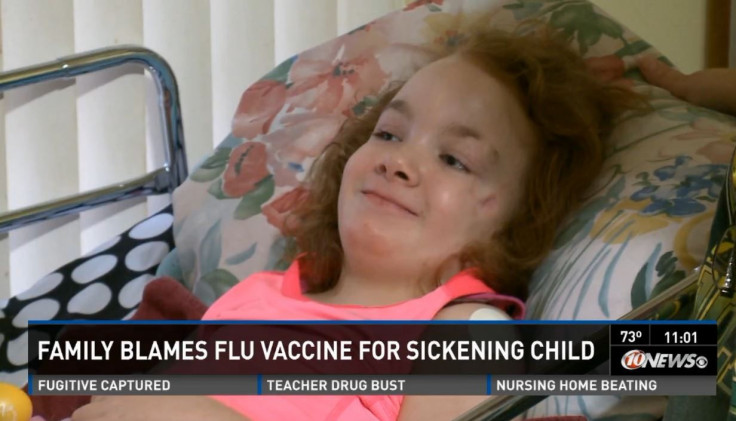Flu Shot Blamed For Paralyzing 10-Year-Old Florida Girl Marysue Grivna

A 10-year-old Florida girl’s condition over the past year is likely to give anti-vaxxers new ammo against the flu shot. Three days after getting one in 2013, Marysue Grivna had difficulty waking up and couldn’t speak. Now, she’s paralyzed and her parents are blaming her condition on the flu vaccine.
“The doctors won’t confirm it or deny it,” Carla Grivna, Marysue’s mother, told Fox & Friends. “Her father Steven and I are certain, due to all our research, that this was what caused Marysue’s condition. She was a happy, healthy, running, and playing 9-year-old. Then this happened.”
Marysue got her flu vaccine on Nov. 22, 2013. Three days later, her condition quickly devolved as the effects of a rare brain disease, known as acute disseminated encephalomyelitis (ADEM), began to take over. It occurs when the immune system attacks the protective covering of nerves, called myelin, in the brain and spinal cord. White matter becomes damaged, and symptoms such as loss of vision and paralysis are common — the disease is often compared to multiple sclerosis.
It’s unclear exactly how the disease develops, which is why doctors have been hesitant to blame the flu vaccine. Grivna told Fox that Marysue underwent multiple tests to try to determine how she got it, but they all came up inconclusive. “It can just appear out of the blue or after maybe a surgical procedure,” Dr. Juan Dumois, director of infectious diseases at All Children’s Hospital in Tampa Bay, Fla., told WTSP News. “It’s otherwise unexplainable.”
According to the National Institutes of Health, the disease “often follows viral or bacterial infections, or less often, vaccination for measles, mumps, or rubella.” About 50 to 70 percent of ADEM cases occur after infectious disease, but with only eight cases per one million people, it’s extremely difficult to determine what caused the sudden, brief attack. And despite the slim chance ADEM results from a flu shot, Dumois said that there’s just as much of a chance from not getting it.
The flu vaccine is an especially difficult vaccine to produce. Every year, new strains of influenza circulate throughout communities, forcing drug companies to tailor vaccine recipes. But it takes about six months to produce a vaccine, so drug companies consult the World Health Organization up to nine months before flu season starts, to learn about the strains most likely to cause sickness. Because this is done so far in advance, not everyone benefits from the vaccine — its effectiveness is considered somewhere between 61 and 77 percent.
It’s true that there’s a chance of developing some kind of illness from vaccines, but the science overwhelmingly shows that they’re effective — most childhood vaccines produce immunity 90 to 100 percent of the time. In fact, not taking vaccines can be worse, as Amy Parker, the child of an anti-vaxxer wrote for Slate: “I struggle to understand why I know far more people who have experienced complications from preventable diseases than I have ever met with complications from vaccines. I have friends who became deaf from measles. I have a partially sighted friend who contracted rubella in the womb. My ex got pneumonia from chickenpox. A friend’s brother died from meningitis.”
Unfortunately, whatever the cause is, Marysue will have to continue living with ADEM (although Dumois said there’s a chance her symptoms will reverse). In the meantime, the family has set up a GoFundMe page asking for donations to help make their home more accommodating of Marysue’s needs, and to take the weight off her father, who carries her nearly everywhere.
Published by Medicaldaily.com



























